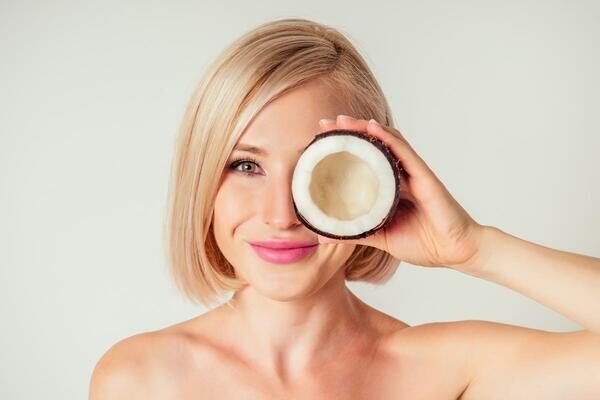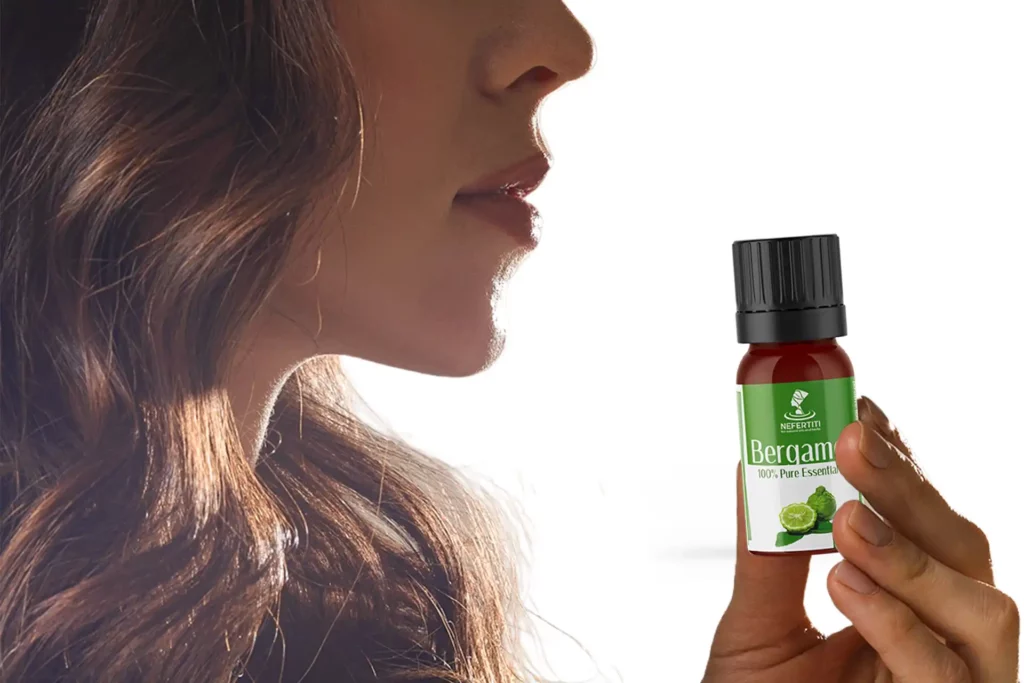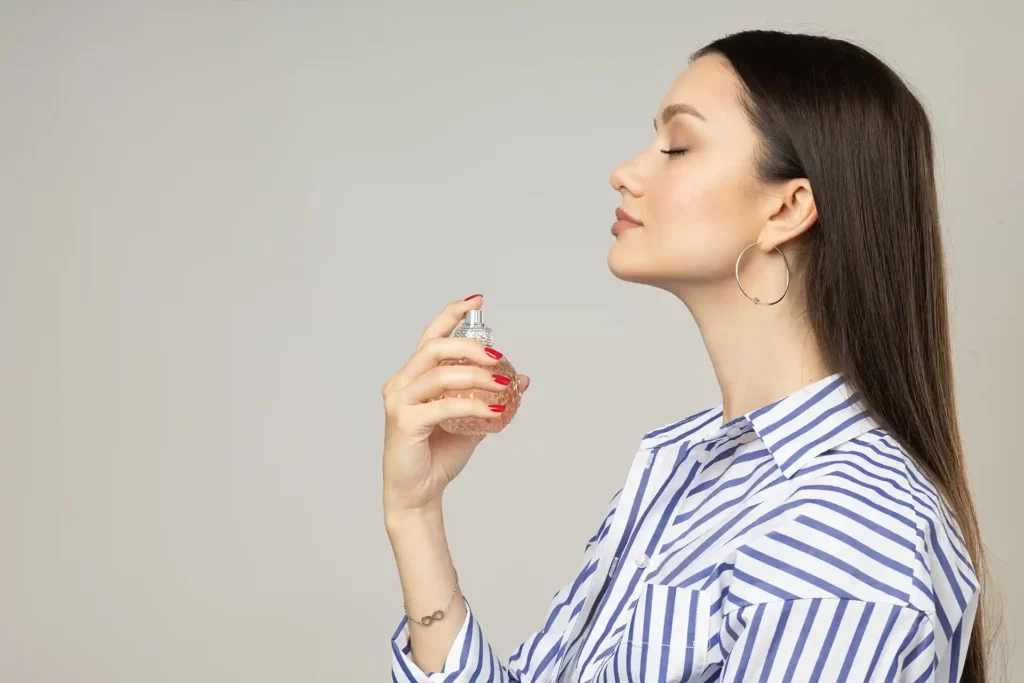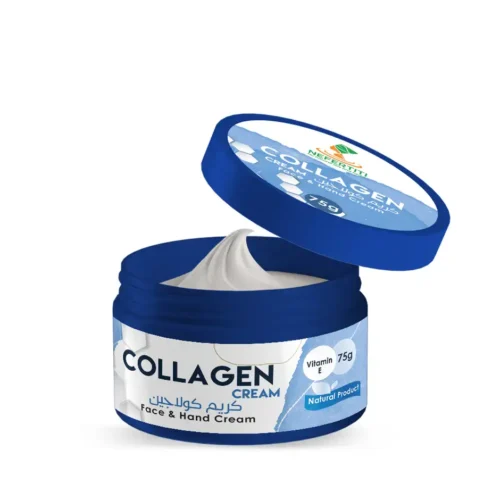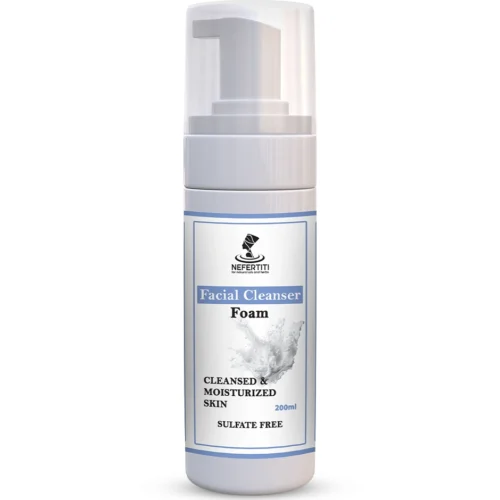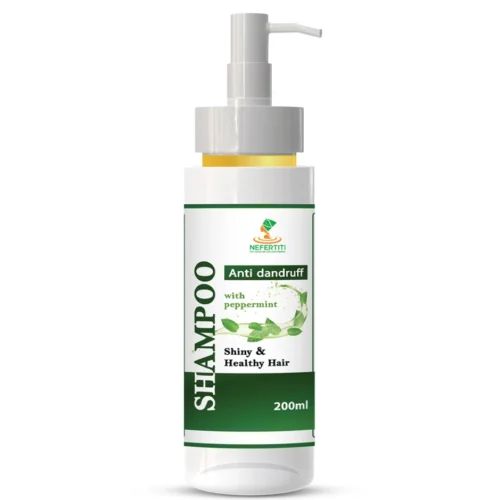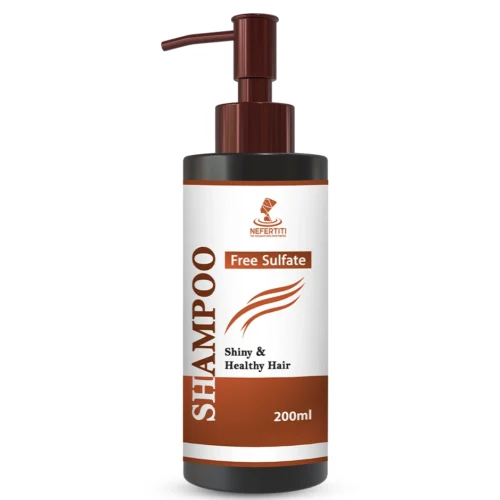Our skin – the most prominent part of the body, nothing out of the ordinary. We all want to make a good impression by our appearance, or look (more) beautiful. To this end, we use creams, lotions, make-up, assuming that’s the trick. Yet our skin is much more than just a shell or an exterior to be embellished, its functions go way beyond general awareness, and skin health is inextricably linked to its protective task.
So …. what exactly is our skin, and what are its specific functions? Just as important: how do we preserve skin health to ensure its proper and optimal functioning? And how can we prevent or treat skin disorders that are so common today? Time for an in-depth expedition about the skin and which 100% natural products can be used effectively for various conditions.
 The skin is the largest organ in the human body. Serving as an indicator of our general health is the most wonderful feature of the skin. In addition to this impressive trait, the skin has a fair amount of tasks as well. These are the seven main functions:
The skin is the largest organ in the human body. Serving as an indicator of our general health is the most wonderful feature of the skin. In addition to this impressive trait, the skin has a fair amount of tasks as well. These are the seven main functions:
Protection – the skin is an anatomical protective layer against pathogens and at the same time it protects our organs from damage caused by external factors.
Sensation – Due to the many nerves connected to our skin, the skin serves as a sensory organ. The sense of touch, feeling of cold or heat, pain or itching, pressure and vibrations are perceived in the skin and this information is sent to the brain by the nerves.
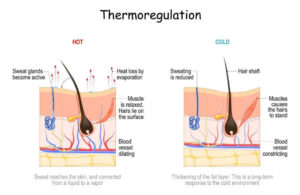 Thermoregulation – regulation of body temperature as well as protection against overheating or hypothermia is the skin’s job. This manifests itself in sweating, and in narrowing or expanding of the blood vessels, either to preserve or release body heat. Even the position of body hair is affected, as a result of which cold leads to goosebumps.
Thermoregulation – regulation of body temperature as well as protection against overheating or hypothermia is the skin’s job. This manifests itself in sweating, and in narrowing or expanding of the blood vessels, either to preserve or release body heat. Even the position of body hair is affected, as a result of which cold leads to goosebumps.
Evaporation – the skin prevents the body from drying out by retaining moisture. If necessary, it ensures the release of moisture, as happens through sweating.
Storage – the skin also serves as a storage place for substances that our body needs, such as lipids and water.
Absorption – the top layer of the skin draws oxygen from the air, instead of from the blood.
Water resistance – the skin acts as a water-repellent barrier, preventing essential nutrients from being flushed out or water entering the body.
However, this perfect machine is not only exposed to a multitude of external factors (dust, pollen, UV rays, air pollution) that we cannot control but certainly also to our living, eating and grooming habits and the products that we digest or use. Just think of the various food allergies or skin irritations caused by chemical additives in common personal hygiene and cleaning products. Proper nutrition has a positive impact on skin health, but above all: natural skin care products can both nourish the skin and at the same time be a beneficial agent in combating or minimizing various skin ailments.
Ageing – whether we like it or not … there is no getting away from this one. Our skin becomes weaker as we age – the layers of the skin tend to thin, becoming more fragile and sensitive. The maturing skin is more prone to irritations or infections. Water is stored in the skin due to collagen, which supports keeping the skin tight and elastic. Well underway towards the age of 30, the collagen content in the skin slowly declines – the onset of the ageing era.
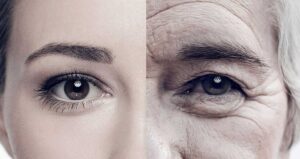 Collagen is the most abundant protein in the human body. It plays a vital role in building bones, teeth and connective tissue such as skin, ligaments, eyes and cartilage. The top layer of the skin consists largely of collagen. The collagen fibres form a kind of supportive corset in the skin: among other things, they ensure that the skin becomes smooth again after smiling. Moreover, these fibres can store large amounts of water, which makes them act as a cushion in the skin. With ageing, collagen formation in the skin decreases. Although this ageing process starts relatively early, it usually does not leave visible traces until the mid-30s.
Collagen is the most abundant protein in the human body. It plays a vital role in building bones, teeth and connective tissue such as skin, ligaments, eyes and cartilage. The top layer of the skin consists largely of collagen. The collagen fibres form a kind of supportive corset in the skin: among other things, they ensure that the skin becomes smooth again after smiling. Moreover, these fibres can store large amounts of water, which makes them act as a cushion in the skin. With ageing, collagen formation in the skin decreases. Although this ageing process starts relatively early, it usually does not leave visible traces until the mid-30s.
External influences can accelerate skin ageing. The most important factor is UV radiation – besides slowing down the formation of new collagen, it also accelerates the breakdown of collagen in the skin. An unhealthy lifestyle plays its part – smoking and alcohol consumption encourage free radical formation, which in turn promotes skin ageing.
And then there are those hormonal influences – especially in women, menopause leaves clear marks on the skin: in the first five years after menopause, the amount of collagen in the skin drops by as much as 30 percent….
Enough reasons to treat and pamper the skin with appropriate care.
Recommended products – Aloe Vera Lotion, Lupine Oil, Almond Oil, Argan Oil
Skin infections, mainly due to fungus, bacteria, virus or mites, can cause reactions such as itching, redness, scaling, blisters, chapping, white rashes, pustules, scabies, or fungal infections of the skin.
Recommended products – Aloe Vera Lotion, Tea Tree Oil
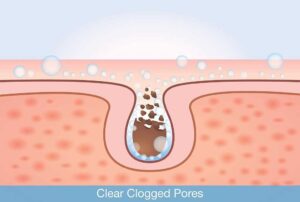
Acne, pimples and blackheads,
usually due to a build-up of sebum which causes inflamed sebaceous glands that in turn develop red pimples. Pimples can be tender or painful and, in severe cases or if left untreated, eventually cause unsightly scars.
Recommended products – Castor Oil, Almond Oil, Jojoba Oil
Eczema (or “dermatitis”) is a genetic condition associated with itchy, dry skin. Atopic or hereditary eczema typically occurs in individuals with known allergies or with a family history of allergies. Eczema usually improves with age.
Contact eczema is caused by dehydration and contact with detergents in everyday life (water, soap, cleaning liquids) or directly by the harmful effects of toxic substances such as solvents, cosmetics, etc.
Recommended products – Shea Butter, Jojoba Oil, Almond Oil
Rosacea is a chronic inflammatory condition of the face, characterized by redness, dilated blood vessels, papules and pustules. It superficially resembles acne. Persistent facial flushing is an early sign of the skin’s uncontrolled sensitivity, it particularly affects those with fair skin, and is more common with ageing.
Recommended products – Aloe Vera Lotion, Coconut Oil, Tea Tree Oil
Psoriasis, an incurable genetic disease in which chronic inflammation leads to scaly red bumps that turn into plaques. Flare-ups come and go haphazardly, exposure to ultraviolet light can provide relief.
Recommended products – Jojoba Oil, Castor Oil
Cold sores, caused by the herpes simplex virus, are most common directly around the lips. This “dormant” virus can be prompted by certain environmental influences, such as sunburn or a cold, to travel along the peripheral nerve to the same skin region over and over again.
Recommended product – Tea Tree Oil, Jojoba Oil
Athlete’s foot, one of the most common skin conditions. And a stubborn and painful one, too. The skin surface (usually of the foot) is infected by a fungus, causing itching, pain and damaged skin.
Recommended products – Aloe Vera Lotion, Tea Tree Oil
 Razor burn may appear on those areas of the skin where the hair has recently been shaved or removed. The shortened (or removed) hair tends to curl into the side of the hair follicle as it re-grows and causes an inflammatory bump.
Razor burn may appear on those areas of the skin where the hair has recently been shaved or removed. The shortened (or removed) hair tends to curl into the side of the hair follicle as it re-grows and causes an inflammatory bump.
Recommended product – Tea Tree Oil
A brief summary of the beneficial effects of the products mentioned above:
Aloe Vera Lotion
Referred to as “the plant of immortality” by ancient Egyptians, nowadays aloe vera is used for various purposes in dermatology due to its many positive properties. What are the active components, and what exactly can aloe vera do for skin care?
 In addition to treating burns and preventing scars, this healing miracle plant has some amazing benefits!
In addition to treating burns and preventing scars, this healing miracle plant has some amazing benefits!
Aloe vera holds 75 potentially active constituents, such as vitamin A (beta-carotene), vitamin C and E (both antioxidants), vitamin B12, folic acid and choline. Minerals contained are calcium, chromium, copper, selenium, magnesium, manganese, potassium, sodium and zinc. These ensure proper functioning of various bodily systems. A variety of additional components in aloe vera have analgesic, antiseptic, antibacterial, antiviral properties, and anti-inflammatory and wound healing action. Some constituents enhance the penetrative effect of other ingredients into the skin.
Aloe Vera Lotion benefits
The large amount of vitamins, minerals and proteins can help with all kinds of skin conditions. Aloe vera has a calming effect on the skin for burns, but is also used to treat acne.
Moisturizing and soothing – 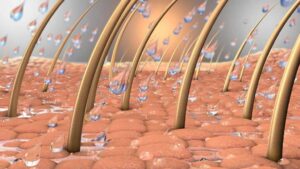 Aloe vera effectively moisturizes by penetrating the deeper layers of the skin. The result? An instantly beautiful radiant skin! Aloe vera significantly softens the skin and stimulates the production of new skin cells.
Aloe vera effectively moisturizes by penetrating the deeper layers of the skin. The result? An instantly beautiful radiant skin! Aloe vera significantly softens the skin and stimulates the production of new skin cells.
Acne and damaged skin – Several components in aloe vera have anti-inflammatory effects, promoting faster healing of acne, blemishes and other skin irritations. Aloe vera is packed with vitamins A, C and E, which help heal insect bites, minor burns and UV damage. Certain substances provide an immediate cooling effect in case of burns, including those from prolonged exposure to the sun. At the same time, the concentration of anthraquinone provides an analgesic effect.
Reduce scars – Since aloe vera stimulates cell production and has great regenerative properties, it also helps reduce minor scars and stretch marks.
Anti-ageing – Vitamins A, C and E are important antioxidants that neutralize free radicals. By stimulating the production of collagen, existing lines and wrinkles are smoothed and the development of new ones is slowed down.
Allergy and itch – Allergic reaction or spontaneous rash after using certain products are quite common. Skin conditions such as eczema or very dry skin may also cause itching. Aloe vera lotion can relieve itching and quickly reduce redness and skin irritation. Good to know as well: it relieves rashes and itching caused by nettle!
Fungal infections – Athlete’s foot or ringworm? Fungal infections are usually quite persistent, causing sore and itchy skin. In addition to the cooling and moisturizing effects, its antibacterial and anti-fungal properties make this lotion ideally suited to treat fungal infections.
Shea Butter
Its easy-to-spread solid consistency makes shea butter a great emollient and soothing product in skin care. Shea butter is a very effective and well tolerated product. It’s rich in different kinds of fatty acids. This unique composition helps rid the skin of excess sebum. At the same time, shea butter moisturizes the skin and restores its protective barrier, which shields the body from harmful environmental influences.
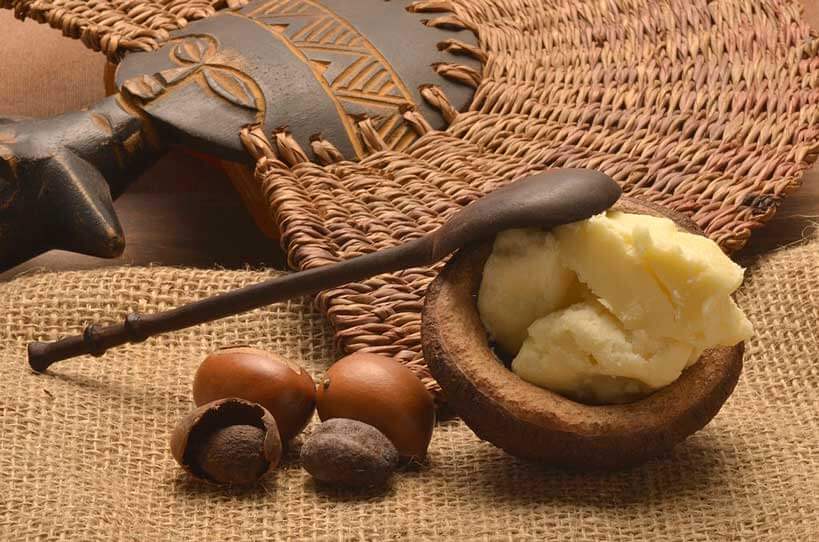 Shea Butter benefits
Shea Butter benefits
Traditionally Shea butter has been used to prevent stretch marks, to treat rheumatism, muscle and joint pains, in skin care and for baby care. It has antioxidant, anti-inflammatory, antibacterial and antifungal properties, prevents acne by balancing sebum production, stimulates collagen production and skin regeneration, and it reduces the appearance of stretch marks, scars, fine lines and wrinkles.
Shea butter stimulates wound healing, makes the skin soft and supple and protects it against dehydrating. Due to its moisture-binding effect and combined with essential oils, shea butter is ideally suited for dry and mature skin. It can treat eczema, dry, flaky or irritated skin, scars, stretch marks, small wounds, rheumatism and sore muscles. Shea butter is great before or after a sun bed (also tanning bed), for irritated baby bottoms and for foot massage. It mixes perfectly with essential oils such as jojoba or coconut.
Argan Oil
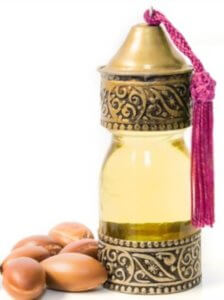 “Moroccan gold”, the honey-coloured Argan Oil, is one of the so-called drying oils and can be used as a carrier oil. It contains large amounts of unsaturated fatty acids (35% of which is linoleic acid) and is loaded with vitamin E. This remarkably high amount of natural antioxidants makes it an excellent protective agent against free radicals and an important ally against ageing.
“Moroccan gold”, the honey-coloured Argan Oil, is one of the so-called drying oils and can be used as a carrier oil. It contains large amounts of unsaturated fatty acids (35% of which is linoleic acid) and is loaded with vitamin E. This remarkably high amount of natural antioxidants makes it an excellent protective agent against free radicals and an important ally against ageing.
Argan oil is very suitable to nurture dry, mature or damaged skin, sunburn, allergic or irritated skin, itching, flaky skin, psoriasis, acne, chicken pox and hair loss. This oil mixes well with other carrier/base oils or essential oils. Adding a minimum of 5% will significantly extend the shelf life of those blends.
Jojoba Oil
Jojoba oil is a more liquid wax. It has a long shelf life, due to its powerful antioxidant properties, which is designed by nature to protect and preserve the proteins in the beans from oxidation. As a result, Jojoba oil is the perfect anti-ageing agent.
It assimilates very well with the skin and provides excellent hydration to the upper layers of the skin. In addition, it slows down the release of sebum, which makes it particularly suitable for oily skin. Due to its soothing effect, jojoba oil in smaller concentrations is also good for the care of dry and sensitive skin. Since the oil does not feel greasy, it can serve as a perfect base for make-up.
Jojoba Oil benefits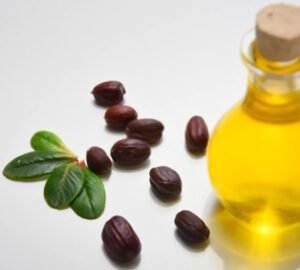
This oil mimics the oily moisture naturally produced by the skin, making it a great option for extremely dry skin or eczema. Jojoba oil can be used as a base oil, it’s quickly absorbed into the skin without leaving a residue and helps moisturize the deepest layers of the skin. Jojoba oil regulates the moisture balance of the skin cells, inhibits sebum production and is therefore suitable for both dry and oily skin. In addition, it protects the skin against the elements, has a natural sun protection factor of 4 and ensures that the tanned skin retains its colour for longer.
Jojoba oil is a widely used product that can be applied both in pure form or mixed with other natural oils. Irritated skin, psoriasis, eczema, scars and inflammation also profit from its healing effects. This oil mixes well with other carrier oils and essential oils.
Castor Oil
Castor oil is a multi-purpose 100% natural oil that helps to retain moisture by preventing water loss through the outer skin layer. Castor oil is a semi-drying thick oil, topical application to the skin in its pure form is considered safe, though it mixes well with other base oils like almond or coconut oil to provide ultra-moisturizing protection.
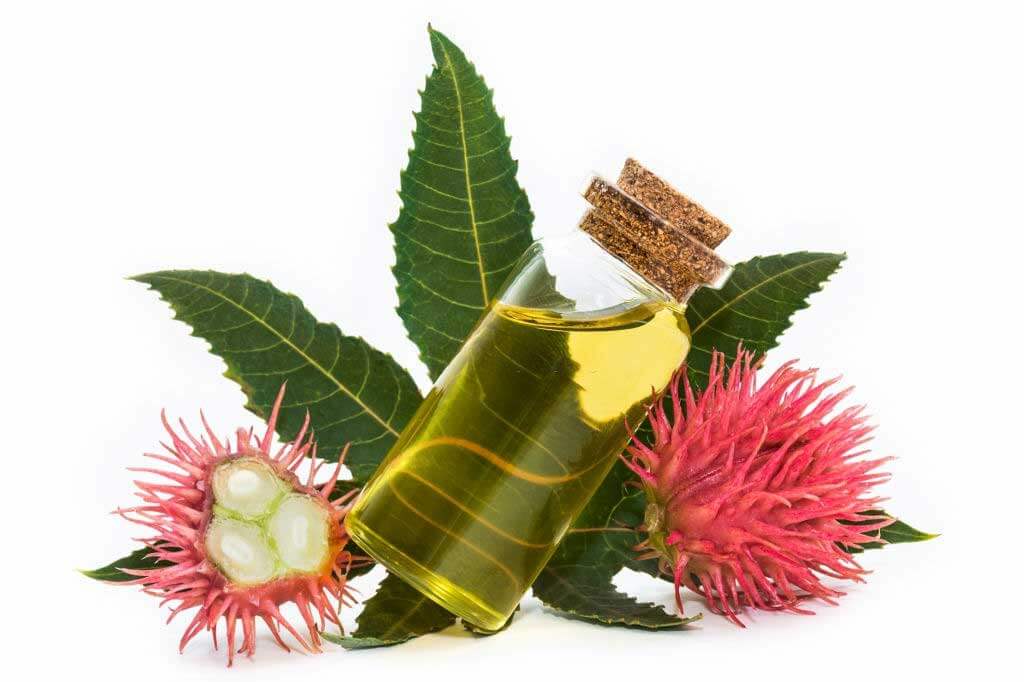 Castor Oil benefits
Castor Oil benefits
Wound healing – Castor oil on wounds creates a moist environment that promotes healing and prevents ulcers from drying out. Meanwhile, it stimulates tissue growth, forming a barrier, thus reducing the risk of infection (from the outside). It reduces dryness, cornification and dead skin cell build-up that would otherwise delay wound healing. Under the protective layer formed, wounds and fissures can heal well.
Anti-inflammatory – The presence of ricinoleic acid provides the impressive anti-inflammatory properties of castor oil. Studies have shown that topical application reduces inflammation and relieves pain. This potential can be beneficial in inflammatory conditions such as rheumatoid arthritis or psoriasis and thanks to its moisturizing properties, it soothes dry and irritated skin.
Acne – Several beneficial properties of castor oil help reduce acne symptoms. Inflammation is believed to play a role in both the development and the severity of acne. Castor oil is an excellent means of reducing the inflammation-related symptoms. In addition, acne has been associated with an imbalance of certain types of bacteria normally found on the skin. Castor oil’s antimicrobial properties help fight bacterial overgrowth. As a natural moisturizer, this oil soothes acne-inflamed and irritated skin.
Lupine Oil
Lupine oil is suitable for dry and sensitive skin, it stimulates wound healing, protects against wrinkles and increased pigmentation, brightens the skin, reduces freckles and age spots. The beneficial properties of Lupine oil are due to the high content of easily digestible proteins, iron, peptides and vitamins A and E. Proteins are responsible for a firm and elastic skin, and for strong muscles. Lupine is a natural peptide that promotes skin renewal, reduces fine lines and the depth of wrinkles, and stimulates the production of collagen and elastin.
Lupine Oil benefits
Anti-ageing – The matured skin gets thinner and its moisture content drops. As collagen deficiency increases over the years, the skin loses its elasticity and the first wrinkles appear around the eyes and the mouth. Lupine oil is an effective anti-ageing agent, due to active ingredients that support cell renewal and skin regeneration. The smoothing and tightening effect on existing wrinkles in addition to its antioxidant properties, helps to maintain youthfulness and elasticity of the skin. This oil evens skin tone, providing the skin with a healthy glow.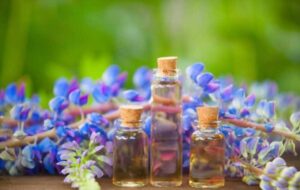
Anti-oxidant – Lupine oil is known for its emollient and antioxidant properties, providing perfect relief for allergies. It is rich in beta-carotene and vitamin E, which help reduce oxidative stress and eliminate free radicals. Antioxidants (beta-carotene and lycopene) protect from environmental stressors, while other active components help maintain a youthful glowing skin. The powerful antioxidant properties support immune processes in the body, prevent the development of malignant tumours and relieve inflammation.
Protection – The first known record of sun protection dates back to Egypt, using ingredients such as rice bran, jasmine and lupine. Although the harmful effects of UV radiation were still unknown, the concept of tanning was understood. Since lighter skin was more desirable in those days, the purpose of sunscreen was purely cosmetic. Only recently it has been discovered that rice bran absorbs UV light, jasmine aids in DNA repair, and lupine brightens the skin.
Lupine oil is an excellent tool for the treatment of skin damage caused by UV-rays and the harmful effects of environmental influences. It contains omega-3 linolenic acid and omega-6 linoleic acid, both capable of calming the skin and noticeably repairing its barrier. High amounts of protein, the hydrating amino acid lysine and vitamin A make this oil a perfect skin moisturizer.
Almond Oil
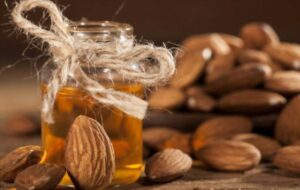 Sweet Almond Oil is a non-drying, soothing oil, suitable for all skin types. It regulates moisture levels in the skin, reduces skin irritations and can be a boon to dry and mature skin. Almond oil has been used for thousands of years to soothe, soften, and repair the skin. Due to its anti-inflammatory and soothing properties, plus its high nutrient content, almond oil has the potential to improve both complexion and skin tone. Jam-packed with antioxidants and fatty acids, sweet almond oil penetrates deeply into the skin, providing instant benefits. Vitamins, minerals, healthy fats and proteins that are present in large amounts, provide a variety of health benefits. Some of the most beneficial nutrients in sweet almond oil include:
Sweet Almond Oil is a non-drying, soothing oil, suitable for all skin types. It regulates moisture levels in the skin, reduces skin irritations and can be a boon to dry and mature skin. Almond oil has been used for thousands of years to soothe, soften, and repair the skin. Due to its anti-inflammatory and soothing properties, plus its high nutrient content, almond oil has the potential to improve both complexion and skin tone. Jam-packed with antioxidants and fatty acids, sweet almond oil penetrates deeply into the skin, providing instant benefits. Vitamins, minerals, healthy fats and proteins that are present in large amounts, provide a variety of health benefits. Some of the most beneficial nutrients in sweet almond oil include:
Vitamin A – (retinol) is known to prevent acne breakouts and assists in maintaining a healthy and well-hydrated in the top two layers of the skin. Production of new skin cells is stimulated by vitamin A, keeping the skin firm and healthy, and reducing the appearance of fine lines and treating wrinkles. Rich in vitamin A, almond oil gives the skin a healthy, radiant glow.
Vitamin D – the “sunshine vitamin” – a beneficial compound to skin health. Vitamin D deficiency can lead to dry skin, hair loss, delayed wound healing, and certain skin conditions, such as psoriasis. Due to the presence of this vitamin, almond oil may help reduce bacterial overgrowth, clear inflamed acne, and alleviate symptoms of dermatitis.
Vitamin E – the “youth-vitamin” – a powerful antioxidant that protects the body from harmful free radicals that have been linked to many chronic diseases and ageing. Almond oil is one of the best sources of vitamin E! When applied topically, it helps to fade scars, heal sun damage and reduce the signs of ageing. The antioxidant properties of vitamin E also prevent cell damage from UV rays. Almond oil acts as an effective barrier that protects the skin from those harmful rays.
Minerals – the high amount of minerals in almond oil are profitable for the skin and overall health. These include magnesium, calcium, potassium and zinc, the latter of which is especially helpful in eliminating acne.
Omega-6 – these fatty acids are remarkably beneficial to skin health. They serve as essential building blocks of the skin, delivering antioxidants for anti-ageing results. The balanced composition (containing up to 30% linoleic acid) results in improved moisture retention, which is key to maintaining a well-hydrated, healthy skin. This promotes a smooth, young-looking, healthy complexion, no matter skin type or age.
Vitamin K – this little-known nutrient plays a big role in maintaining skin health. It provides a youthful appearance by strengthening capillaries throughout the body and reducing fluid retention under the eyes. It is also known to reduce redness of the skin and soothe sensitive skin. Due to the presence of vitamin K, almond oil may reduce the appearance of stretch marks, spider veins, and scars.
Almond oil is generally considered safe, however, take into account any known nut allergy. A patch test on the skin is recommended before using this oil.
Coconut Oil
Coconut oil only becomes liquid at higher temperatures (above 25 °C) and is an excellent carrier oil that mixes well with other base oils. Coconut oil is a non-drying oil, it absorbs quite slowly into the skin, giving it excellent protection against dehydration, with the small disadvantage that the skin feels slightly oily. This oil has a softening and protective effect, is particularly suitable for dry or rough skin, and for calluses or chapping.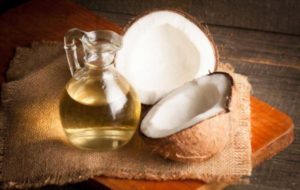
Coconut Oil benefits
Hydrates – the fatty acids contained help to reduce dryness and allow the skin to retain moisture. Coconut oil smooths into skin easily, providing instant hydration.
Protects – provides a protective barrier, that shields the skin from environmental toxins, dirt and other icky stuff it’s faced with on a daily basis.
Anti-bacterial – lauric acid found in coconut oil is responsible for the antimicrobial properties, to kill bacteria on the skin and reduce inflammation.
Antioxidant – antioxidant components in coconut oil boost skin nutrition and combat environmental factors that can accelerate signs of ageing.
Minimize wrinkles – coconut oil absorbs into the skin easily, it helps reduce the signs of ageing by making fine lines and wrinkles less noticeable.
Smooths – the calming and smoothing effect of coconut oil is immediately felt. It may alleviate irritations or sensitivity and provide soothing relief.
Above all: smells great! – along with all of this oil’s assets, that enticing tropical coconut scent is merely an added bonus.
Tea Tree Oil
Tea tree oil is highly lipophilic (meaning: fat-soluble and fat-dissolving). The powerful antibacterial effect is partly based on this property, but mainly on the exceptional ability to penetrate deep into the skin and underlying tissue.
According to the Aborigines, Tea Tree oil is a panacea. It has several properties that contribute positively to skin healing and numerous other uses. Tea Tree oil can be used in the treatment of flu, colds, canker sores, sore throat, athlete’s foot, ringworm, itching, head lice, pimples and ulcers. This oil is said to kill many bacteria, fungi, viruses and amoebas, it may even neutralize the poison of most small insects. Tea Tree oil can be used successfully against skin fungi and other contaminants due to its antifungal effect. In addition, it has a mild analgesic effect, which is beneficial in the treatment of cuts, scrapes and burns, it relieves itching and inhibits the development of bacteria.
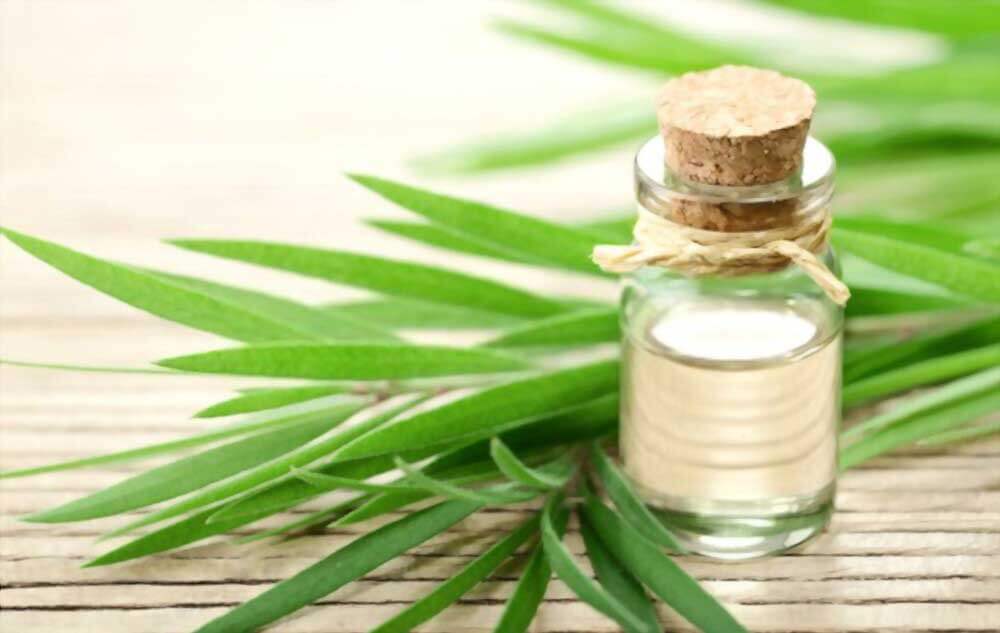 Tea Tree Oil benefits
Tea Tree Oil benefits
Tea tree oil is one of the most notable antiseptics in alternative healing methods! Its antiseptic properties are said to be twelve times stronger than that of phenol, a chemical disinfectant. It helps fight bacteria and inflammation, both of which can contribute to acne breakouts. Due to its anti-inflammatory, antiseptic and nourishing properties Tea tree oil is a great agent to treat a variety of skin conditions.
Radiant skin – Tea tree oil is not harsh and doesn’t cause excessive dryness, skin peeling or redness. Get that glowing, flawless skin you’ve always wanted!
Acne – Tea tree oil is considered one of the most effective products to treat acne, as its antimicrobial properties can kill the acne-causing bacteria. It penetrates deep into the pores, removing toxins and preventing clogging. Tea tree oil reduces inflammation, lightens scars, moisturizes and restores the skin’s natural oil balance.
Infections and scars – Tea tree oil is a powerful, yet gentle disinfectant. Tea tree oil has been shown to be extremely effective in healing infections. A mixture of tea tree oil and honey is a perfect means to heal burns and reduce scarring.
Wound healing – In addition to preventing or reducing infections, tea tree oil can also promote wound healing. It stimulates the activity of white blood cells that play a vital role in the healing process.
Anti-inflammatory – this property is especially beneficial in eczema and atopic dermatitis, as (excessive) scratching during flare-ups can cause the skin to tear, making it more susceptible to inflammations.
Psoriasis – an autoimmune disease, characterized by red, itchy, scaly skin for which there is no known cure. The anti-inflammatory compounds in Tea Tree oil have, according to emerging evidence, relieving effects on the symptoms of psoriasis. Mix 10-15 drops of tea tree oil with two tablespoons of coconut oil, apply to affected areas 2-3 times a day.
Athlete’s foot – a contagious, difficult to treat fungal infection on the feet that can spread to toenails or to the hands. Tea Tree oil is an effective means to relieve symptoms such as itching, peeling, cracked skin, blisters and redness.
Nail fungus – a fairly common infection. Although harmless, the aesthetic effect is less attractive. Tea tree oil has been shown to help get rid of nail fungus.
Natural deodorant – secretion from the sweat glands combined with bacteria on the skin can cause a moderate to strong odour, especially under the armpits The antibacterial properties of tea tree oil can help control the odour associated with perspiration.
Mouthwash – tea tree oil may fight germs that cause tooth decay and bad breath. One study found that tea tree oil was more effective against plaque-causing bacteria than a regular disinfectant and oral rinse. Just a drop of tea tree oil mixed with a cup of warm water, to rinse the mouth for about 30 seconds. Like other mouthwashes, tea tree oil should never be swallowed!
Insect repellent – a test-tube study revealed that tea tree oil had a greater ability to repel mosquitoes than DEET, the most common active ingredient in commercial insect repellents.
Tea Tree oil should always be diluted with a carrier oil, such as jojoba, coconut or almond oil, before applying to the skin. It mixes well with Lavender, Geranium, Marjoram and Clove Bud .
https://www.verywellhealth.com/almond-oil-for-skin-5083921
https://www.healthline.com/health/beauty-skin-care/almond-oil-for-face
https://www.byrdie.com/coconut-oil-for-skin
https://fleurandbee.com/blogs/news/coconut-oil-for-skin
https://www.anthemis.nl/index.htm
